On Evangelical Masculinities
A review of Jesus and John Wayne and a reflection on evangelicals, masculinity, and race
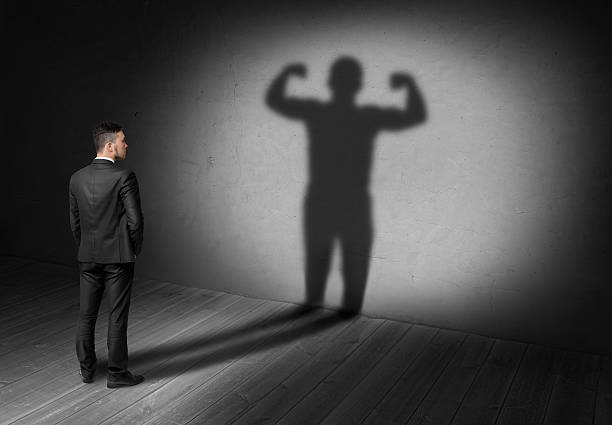 White evangelicals in the United States fell in love with a foul-mouthed man who never had a born-again experience of faith. Far from being an emblem of “family values,” this man, who cemented his myth and persona by his on-screen acting, had married three times, divorced twice, carried on several high-profile affairs, and helped circulate racist stereotypes to the masses. I’m not talking about Donald Trump but John Wayne. And lest I appear to be committing plagiarism, let me be clear that I didn’t come up with this observation myself but got it from the historian Kristin Kobes Du Mez. Her latest book, Jesus and John Wayne: How White Evangelicals Corrupted a Faith and Fractured a Nation, argues that white evangelicals’ embrace of Trump is the manifestation of a militant masculine ideal that’s been more than 50 years in the making.
White evangelicals in the United States fell in love with a foul-mouthed man who never had a born-again experience of faith. Far from being an emblem of “family values,” this man, who cemented his myth and persona by his on-screen acting, had married three times, divorced twice, carried on several high-profile affairs, and helped circulate racist stereotypes to the masses. I’m not talking about Donald Trump but John Wayne. And lest I appear to be committing plagiarism, let me be clear that I didn’t come up with this observation myself but got it from the historian Kristin Kobes Du Mez. Her latest book, Jesus and John Wayne: How White Evangelicals Corrupted a Faith and Fractured a Nation, argues that white evangelicals’ embrace of Trump is the manifestation of a militant masculine ideal that’s been more than 50 years in the making.
When a majority of white evangelicals aligned themselves with Trump in 2016, many people sought to explain the bizarre union with different theories. These are not genuine evangelicals, some protested. Others pointed to economic motivations or to the notion that most evangelicals simply held their nose to choose the lesser of two evils. Some people simply threw their hands up and charged evangelicals with rank hypocrisy. Yet none of these theories hold up strongly upon closer scrutiny. Before facing Hillary Clinton, Trump was able to beat out other Republicans in the primaries who seemed more favorable to evangelicals, like Ted Cruz or Marco Rubio. Du Mez thinks the theories miss something: “. . . for many evangelicals, Donald Trump did not represent the betrayal of many of the values they had come to hold dear. His testosterone-fueled masculinity aligned remarkably well with that long championed by conservative evangelicals.”
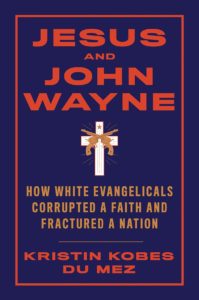 In order to make this case, Jesus and John Wayne provides an expansive account of how conservative white evangelicals embraced a rugged and violent form of masculinity since the middle of the 20th century. The book looks at places like Colorado Springs, a hotbed of literal militancy where believers built organizational juggernauts and aggressively made inroads with the military. It covers the who’s who of patriarchal evangelicalism, including figures like Albert Mohler, Eric Metaxas, Oliver North, James Dobson, and the movement’s greatest hits like Wild at Heart and Left Behind. But it also features women like Phyllis Schlafly, who opposed the Equal Rights Amendment, and Sarah Palin, who embodied a conservative feminine ideal that pleased evangelical men. Most importantly, the book sets all of these developments against a longer historical backdrop. In the western expansion of the United States, a new masculinity was forged predicated on a white armed protector bringing law and order to savagery. Here, John Wayne (1907–1979), the prolific actor who often played a cowboy fighting Native Americans in Westerns, towers above all.
In order to make this case, Jesus and John Wayne provides an expansive account of how conservative white evangelicals embraced a rugged and violent form of masculinity since the middle of the 20th century. The book looks at places like Colorado Springs, a hotbed of literal militancy where believers built organizational juggernauts and aggressively made inroads with the military. It covers the who’s who of patriarchal evangelicalism, including figures like Albert Mohler, Eric Metaxas, Oliver North, James Dobson, and the movement’s greatest hits like Wild at Heart and Left Behind. But it also features women like Phyllis Schlafly, who opposed the Equal Rights Amendment, and Sarah Palin, who embodied a conservative feminine ideal that pleased evangelical men. Most importantly, the book sets all of these developments against a longer historical backdrop. In the western expansion of the United States, a new masculinity was forged predicated on a white armed protector bringing law and order to savagery. Here, John Wayne (1907–1979), the prolific actor who often played a cowboy fighting Native Americans in Westerns, towers above all.
Even though John Wayne wasn’t an evangelical, they fervently embraced him. Wayne came “to symbolize a different set of virtues — nostalgic yearning for a mythical ‘Christian America,’ a return to ‘traditional’ gender roles, and the reassertion of (white) patriarchal authority.” Du Mez’s emphasis on Wayne is apt. His name and persona come up over and over again among the evangelical men attempting to define “biblical” manhood. And Wayne proves how white evangelicals were willing to embrace an outsider to their faith, a politically incorrect strongman who could defend their values and vanquish their enemies, well before Trump.
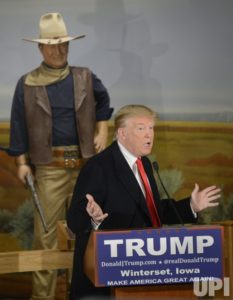
Donald Trump at the John Wayne Museum in 2016
Conservative evangelicals’ affinity for a John Wayne or Donald Trump reveals the limits of reducing religion to beliefs. For a long time, evangelicals and historians of evangelicalism (and often people who were both) defined evangelicals by their professed theology. In 1989, David Bebbington famously characterized evangelicalism by four qualities: conversionism, the belief that lives need to be changed; activism, the expression of the gospel in effort; biblicism, a particular regard for the Bible; and crucicentrism, a stress on the sacrifice of Christ on the cross. The “Bebbington quadrilateral” became a popular way of describing evangelicals, and one that evangelicals themselves embraced. In this framework, the core of evangelicalism — its particular set of beliefs — is separable from its entanglement with polarized politics. But this seems to be an inadequate description of how religion works, of how belief coincides with and arises alongside various identities. For example, studies have shown that most white evangelicals today are highly motivated by racialized fears of cultural displacement. Considering that segregation was just as important as abortion to the rise of the Christian Right, and that this nation fought a civil war over slavery, would it be wrong to say that whiteness is a crucial component of evangelical identity today, and that this isn’t a new thing or some fall from a pristine tradition?
Du Mez rightfully understands evangelicalism as an interplay between belief and culture. Evangelical identity runs along multiple axes. As Du Mez describes it, this identity includes “a staunch commitment to patriarchal authority, gender difference, and Christian nationalism . . . intertwined with white racial identity.” Evangelicals are not only what they believe about the Bible and Jesus. Evangelicals are also communities and the subcultures they’ve created, the vast networks of Christian institutions they’ve built, which include schools, bookstores, parachurch organizations, and media ministries. If you pay attention to what evangelicals have consumed over the past several decades, like Du Mez assiduously does, then it doesn’t look like a coincidence that they could be attracted to someone like Trump.
In addition to seeing the hyper-masculinity around Trump and his supporters with a new pair of eyes, reading Jesus and John Wayne can give one a strange sense of déjà vu. Are evangelicals attempting to push Christian nationalist policies through the president’s administration? Well, we could go back to Billy Graham’s Christian nationalist influence on Dwight D. Eisenhower. Does Jerry Fallwell Jr.’s sex life make him a hypocrite given how he opposes the LGBTQ community? Before him there was Ted Haggard who was exposed in having a male escort while pushing for an anti-LGBTQ law, and a long list of other duplicitous men. Will evangelicals really go so far as to oppose democratic norms and support a foreign power known for undermining human rights? It didn’t stop them from supporting the Contras in Nicaragua during the 1980s and from supporting evangelical men like Oliver North who broke the law and lied to Congress about his involvement. The parallels can go on and on. Du Mez’s point about the politicization of evangelical masculinity is right. Even when conservative evangelical teachings about masculinity appeared to be simply personal and spiritual, they weren’t apolitical. The militant masculine ideal depended on adversaries, either foreign or domestic, and some type of war to fight.
Even if evangelicalism’s history leading up to Trump gives the impression of inevitability, Du Mez highlights episodes that show how things could have been otherwise. One chapter focuses on the Promise Keepers movement of the 1990s. The Promise Keepers held massive rallies in the nation’s capital and sports arenas around the country, attracting up to 700,000 men, in which they were encouraged to honor God, protect their families, and pursue virtue. These rallies often took on a highly emotional nature, featuring men crying and lifting their hands. They also started to emphasize the concept of “racial reconciliation,” and provided a platform for Black men like Tony Evans, Wellington Boone, and John Perkins. While some of the leaders in this movement held to traditional, hierarchical gender roles, some did not. For example, Gary Oliver published Real Men Have Feelings Too in 1993. At some points, it looked as though the Promise Keepers’ masculine ideal of the “tender warrior” could replace the more rigid and violent masculinity elevated within evangelicalism. So what happened?
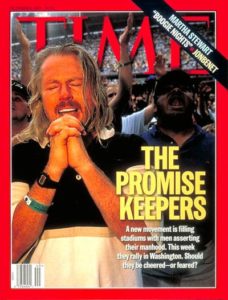 The Promise Keepers’ alternative evangelical masculinity came apart both from the outside and from within. First, the terrorist attacks of September 11, 2001, elicited calls for a tougher masculinity. Second, although Promise Keepers membership remained predominately white (90 percent according to one questionnaire), the group’s nods to diversity and inclusion seemed to have caused a racist backlash from white men. In 1996, 40 percent of complaints registered by conference participants were negative responses to the theme of racial reconciliation. Third, the Promise Keepers received a steady stream of criticism from evangelicals who considered it too soft and a Trojan horse for feminism and homosexuality. A rising-star pastor in the evangelical world named Mark Driscoll, then associated with Mars Hill Church in Seattle, called it “pussified James Dobson knock-off crying Promise Keeping homoerotic worship . . .”
The Promise Keepers’ alternative evangelical masculinity came apart both from the outside and from within. First, the terrorist attacks of September 11, 2001, elicited calls for a tougher masculinity. Second, although Promise Keepers membership remained predominately white (90 percent according to one questionnaire), the group’s nods to diversity and inclusion seemed to have caused a racist backlash from white men. In 1996, 40 percent of complaints registered by conference participants were negative responses to the theme of racial reconciliation. Third, the Promise Keepers received a steady stream of criticism from evangelicals who considered it too soft and a Trojan horse for feminism and homosexuality. A rising-star pastor in the evangelical world named Mark Driscoll, then associated with Mars Hill Church in Seattle, called it “pussified James Dobson knock-off crying Promise Keeping homoerotic worship . . .”
Du Mez provides fascinating profiles of the evangelical leaders who forged its militant masculinity. Perhaps giving away my age, I’ll say I was most familiar with Mark Driscoll and his “New Calvinist” colleagues who blew up in the 2000s. These Calvinists, who also sometimes went by the label “Reformed,” were a subset of the conservative evangelical movement who emphasized the “reformed” doctrines of John Calvin and others following him. During high school, I went through a Calvinist phase in which I habitually swallowed content from white evangelical pastors like Mark Driscoll, John Piper, Tim Keller, John MacArthur, R.C. Sproul, and others. For a season, they became my authorities on faith and masculinity. I’d never gone to a white evangelical church before and I hadn’t grown up around white evangelicals. I went through public schools on Long Island that were more than 90 percent people of color. So, you may be wondering, how did someone like me enter this world? To oversimplify my story, it was the podcasts, YouTube videos, blogs, and music that were readily available. When I embarked on spiritual quests by visiting Christian bookstores, I came across their work. I also listened to Christian hip-hop and my favorite rappers all referenced these white Calvinist men. My journey exemplifies what Du Mez describes as the “vast quantity of religious products” produced and consumed by evangelicals, and the degree to which “evangelical consumer culture extends far beyond the orbit of evangelical churches.”
In 2011, the Christian hip-hop collective known as 116 Clique (named after Romans 1:16) released a song called “Man Up.” The music video, which has been viewed more than 5 million times, displays a group of young men of color running with a flag emblazoned with the letters “M” and “U.” They are symbolic torch bearers for the collective’s defiant manifesto on biblical masculinity. In his verse, the rapper KB says: “Instead of leading, no we ain’t leading we bump that / Basically little boys with muscles and a mustache / The femininity, we need a remedy / The God-Man a hundred percent masculinity.” To be fair, I think it’s hard to deny that Black men and men of color, in urban areas and otherwise, are in need of healing — like any other group of men. I’m not against messages that emphasize healthier masculinities or personal responsibility per se. But the masculinity promoted by this world of Christian hip-hop was often consonant with that of white evangelical pastors in the Calvinist/Reformed camp. Additionally, it overlapped with other variants of Black male empowerment that blamed broken homes and communities on matriarchy.
In another notable Christian rap song, a verse says, “I got a backpack full of tracts, plus I keep a Johnny Mac so we can pound it out.” Johnny Mac is a reference to the biblical commentary published by John MacArthur, which contained the following teaching: “A woman’s subordinate role did not result after the Fall as a cultural, chauvinistic corruption of God’s perfect design; rather, God established her role as part of His original creation.” In the 2017 article “Is Reformed theology for black people?,” Jemar Tisby, who headed the Reformed African American Network before it was rebranded as The Witness: A Black Christian Collective, confirmed that the rise of Christian hip-hop consciously drew from the teachings of white Reformed pastors and led to a surge of interest in Reformed theology among African Americans. In Christianity Today, evangelical professor Anthony Bradley said, “Reformed hip-hop is a theologically driven masculinity movement. It says no to the prom songs to Jesus in CCM, no to whiny emo Christian music for hipsters, and no to empty, shallow, individualistic Christian music lacking theological content produced out of Nashville.”
Regarding race and evangelical masculinities, Du Mez writes the following in her book:
“While dominant, the evangelical cult of masculinity does not define the whole of American evangelicalism. It is largely the creation of white evangelicals . . . With few exceptions, black men, Middle Eastern men, and Hispanic men are not called to a wild, militant masculinity. Their aggression, by contrast, is seen as dangerous, a threat to the stability of home and nation.”
I think this is slightly off the mark. Within the hierarchy of evangelical masculinities, are Black evangelical men and evangelical men of color subordinated to white evangelical men? Yes. Are Black men punished for striving toward a militant masculine ideal? It depends. As the Christian hip-hop movement of the early 21st century demonstrated, Black evangelical men could pursue a hyper-masculine ideal — with the blessing and support of white evangelical leaders — as long as it was directed inwardly or toward their respective community. I recall James Baldwin, who was Black, queer, and a former preacher, saying: “In America I, precisely, am the flesh, which the Christians must mortify.” Black male aggression is seen as dangerous in relation to white women and white male authority. But in relation to Black women, trans people, or less-than-manly men, it’s another story.
White evangelicals created their John Wayne cult of hyper-masculinity, but they don’t have a monopoly on evangelical hyper-masculinities as such. Latino, African-American, or Asian pastors don’t need white evangelicals in order to have sexism in their churches. Trump’s administration received considerable support from conservative Latino pastors. And according to preliminary data from the 2020 presidential election, Trump gained ground with some Latino and African-American men. I’m not saying that white evangelical masculinities and these others occupy the same place within the hierarchy of evangelicalism. And Du Mez is correct to stress the particular power wielded and damage exerted by white evangelical men. But I don’t think the men of color who still orbit the evangelical world should be let off the hook. White evangelical men can make room for, and even work in tandem with, a Black hyper-masculinity (I’m picturing Voddie Baucham Jr. in my head) as long as white masculinity isn’t threatened by it.
In the song “Man Up,” the Christian rapper Lecrae says in his verse: “Momma want some Obama in me / The hood want ‘Pac hip-hop wanna see the Common in me / And since it’s a senseless contradiction / I end up a misfit tryna fit in.” By referencing Obama, Tupac, and Common, Lecrae is explicitly wrestling with different masculine role models in relationship to the “biblical” ideal championed in the song. His expression of being a misfit holds true in multiple ways for the trajectory of his career. As a Black evangelical, Lecrae has had to carve out his place both within evangelicalism and the wider music industry.
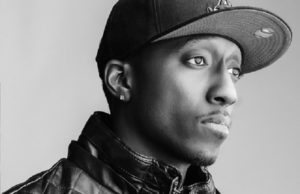
Rapper Lecrae of 116 Clique
Earlier this summer, Lecrae recorded a conversation with evangelical pastor Louie Giglio that sparked controversy. Giglio called slavery a “blessing” and expressed his preference for the term “white blessing” over “white privilege.” Lecrae was widely criticized for remaining silent and offering no push-back to Giglio, and later offered multiple apologies. When I watched the clip of the conversation, I had a strong visceral reaction. Maybe it was because it reminded me too much of my own youthful days as a conservative Calvinist. One part of me was shocked that Lecrae, a Houston-native and part of a generation of Christian rappers known for having sharp things to say about secular rappers and heresy, was silent in that moment. Another part of me recognized the dynamic. When I was a Calvinist, I internalized a certain kind of reverence for white evangelical pastors. Black men were supposed to be “biblically” hyper-masculine, but in relationship to white Christian men we were called to be properly docile. Or, thinking more cynically, it’s also a matter of access. Conservative evangelical men of color exist but occupy a tenuous space within the hierarchy of the evangelical world. They know, in one form another, that pastors like John Piper or Louie Giglio hold the resources and the keys. I can’t say what went down in Lecrae’s or Giglio’s hearts, but that conversation for me was emblematic of the kinds of negotiations that take place between white and Black evangelical men.
By the time you reach the end of Jesus and John Wayne, you get to see one of the major consequences reaped by evangelicals’ masculine ideal. That consequence is abuse. Many of the men that Du Mez profiles end up getting exposed or accused of various forms of abuse and toxic behavior. Male evangelical leaders may have once contented themselves by believing that this was mostly a Catholic problem, but over the last years major patterns of abuse have also been uncovered in evangelical church networks and ministries. Even moderate to progressive evangelicals, a smaller group in the evangelical universe, aren’t immune. Du Mez points to the sexual misconduct of Bill Hybels at Willow Creek Community Church. Then there is Chris Heuertz, a popularizer of the Enneagram who is facing several allegations of abuse. In 2018, Noel Castellanos of the Christian Community Development Association, a progressive evangelical organization, resigned as president. In this case, the abuse of power was not sexual in nature but several women accused Castellanos of a “toxic masculinity” that demeaned women and expressed itself through yelling and the slamming of fists on tables.
Is it time for more people to acknowledge problematic masculinities among progressive evangelicals? Conservative and progressive evangelical leaders can appear worlds apart, but in these situations, they can follow the same playbook. Men amass an inordinate amount of power within institutions that provide them little accountability, overseen by boards that are stacked with their own friends, exchanging favors within a network of male leaders who are also doing the same thing. It’s a recipe for tyrannical behavior. In the progressive evangelical version, the masculine ideal isn’t necessarily tied to a Macho Jesus who kicks ass. Maybe it’s Jesus the Charismatic Justice Activist who speaks on behalf of the “least of these” or the Spiritual Guru who monetizes wisdom learned in the slums of some “third-world” country. John Wayne fought Native Americans, but warrior ideals can come in many forms. One progressive Black evangelical has even held up Joshua, the biblical character who led the conquest and genocide of the Canaanites and became a favorite citation of modern settler-colonialists, as a template for Anti-Racist Warrior!
What does the election of Joe Biden mean for the future of white evangelicals’ militant masculinity? Du Mez asserts that this expression of masculinity didn’t begin with Trump and it won’t end with him. In fact, white evangelicals’ militancy has always required an ever-present sense of threat. She documents how it picked up steam during the Cold War and under the presidency of Barack Obama. Whether the threat is real, imagined, or completely fabricated, white evangelicals seem to get only more reactionary and violent when they perceive themselves to be losing their status. It’s unclear whether Biden’s expression of masculinity as a compassionate Catholic can shape those who reveled in Trump’s aggressions. Trump may have lost the election. The overwhelming support of evangelicals couldn’t save his political career this time. But there are plenty of reasons to remain concerned about what they could do moving forward.
Daniel José Camacho is a writer and editor. His work has appeared in The Guardian, Sojourners, ABC Religion & Ethics, TIME, and the Washington Post. He has a B.A. in Philosophy from Calvin College and an M.Div. from Duke Divinity School.
***
Published with support from the Henry R. Luce Initiative on Religion in International Affairs.